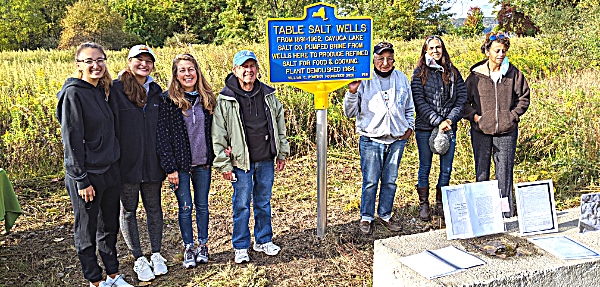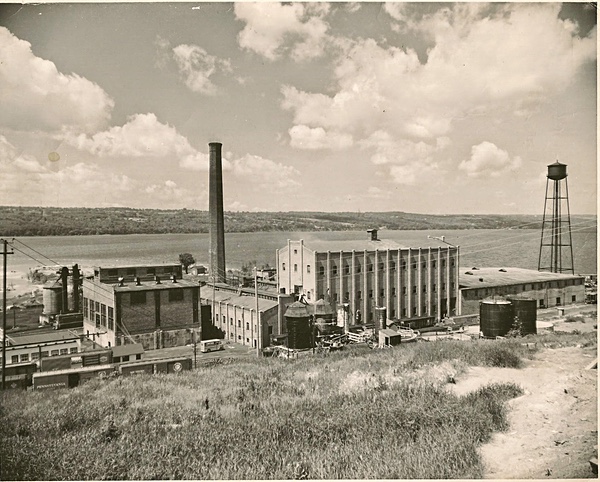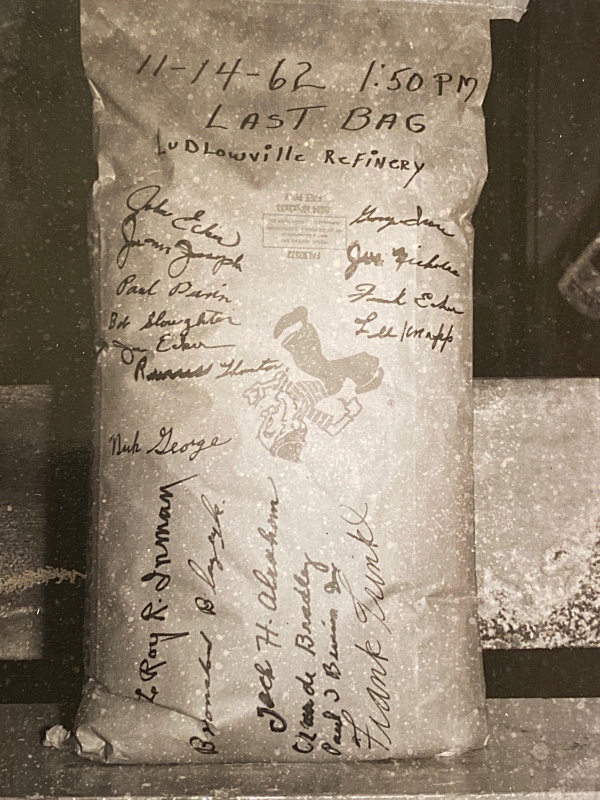- By Robert Rieger
- Around Town
 Print
Print  Descendants and two workers of the salt company attending the unveiling event: (left to right) Morgan Todi, Taylor Todi, Shannon Bowman, Ron Bowman, Gus Isaac, Judy Isaac and Pam Fisk. Photo by Robert Rieger
Descendants and two workers of the salt company attending the unveiling event: (left to right) Morgan Todi, Taylor Todi, Shannon Bowman, Ron Bowman, Gus Isaac, Judy Isaac and Pam Fisk. Photo by Robert RiegerThirty-five people attended a ceremony on Saturday, October 3, to unveil a historic marker placed at the Salt Point Natural Area in Lansing. Members of the Friends of Salt Point group, which manages the natural area in cooperation with the Town of Lansing, arranged placement of the marker to commemorate the table salt processing that took place there from 1891 to 1962. Event attendees were required to wear masks and practice social distancing.
Long-time Lansing residents Guy Isaac and Ron Bowman, who both worked at the plant prior to its closure, unveiled the blue and yellow marker. Town Supervisor Ed LaVigne and Lansing resident Donna Scott, who wrote the funding grant and researched the history for the marker, spoke at the event.
"It's great to have our town volunteers help us celebrate our local history," LaVigne told the group. "We're excited about everything that's happening here at Salt Point." The marker reads: "Table Salt Wells. From 1891-1962, Cayuga Lake Salt Co. pumped brine from wells here to produce refined salt for food & cooking. Plant demolished 1964."
 International Salt Co. (formerly Cayuga Lake Salt Co.) prior to closing and demolition in 1962. Photo from Lansing Historical Society
International Salt Co. (formerly Cayuga Lake Salt Co.) prior to closing and demolition in 1962. Photo from Lansing Historical SocietyThe marker is placed near where the first salt well was drilled and the company's processing facilities were sited. This was the first successful brine salt well drilled in Tompkins County. The extensive, relatively pure salt found there led to the formation of the table salt company, which was later known as International Salt Company. The company processed table salt from brine, which was pumped from salt deposits below Salt Point. At any given time, nearly 100 men and women, many of whom were Syrian and other immigrants, worked at the plant.
Research for the marker was conducted by Scott. "We relied only on primary sources, such as the first official written records. We couldn't rely on hearsay or second-hand accounts." In her grant application, Scott used a copy of the original deed, annual reports from the company, and photographs and other materials found by Donna Eschenbrenner, an archivist at The History Center In Tompkins County.
The salt company closed in 1962 and some of the processing equipment was moved to Watkins Glen. The land was given to the NYS Department of Environmental Conservation, which signed an agreement in 2006 with the Town of Lansing for management of the natural area. Isaac, age 97, worked at the plant starting from when he came home from the war in 1945 until the plant's closure in 1962. He worked in the shipping department, sewing 100 pound bags and helping load rail cars.
"It was like the League of Nations there," said Isaac. "There were Polish, Syrians, Italians, Germans and Slovaks. It was a clean, well-run company, a good place to work." Isaac described how they shipped products via trucks, barge boats, and train. "They had a line of box cars waiting," he said.
 Last bag of salt prepared at Salt Point, signed by various workers. Photo provided by Gus Isaac
Last bag of salt prepared at Salt Point, signed by various workers. Photo provided by Gus IsaacIsaac's father and mother immigrated from Syria in the late 1800's. His father, Anthony Isaac, also worked at the salt plant as an engineer on the boilers. The family lived in company housing in the area known as Syrian Hill. "They charged us $3 per week for rent. They took it right out of our paycheck," said Isaac.
Although Bowman only worked at the salt plant in maintenance as a summer job during college, several of his family members had a long tenure there. His mother was a nurse at the salt plant starting from the early 1950s until the closing in 1962. "I think my mother had something to do with me getting a job there," Bowman said. His grandfather, Avery Stoner, worked as a carpenter at the salt plant but was killed in a tragic accident while on the job in 1939. "Unfortunately he died less than a year after I was born," said Bowman. "Many people told me he was a very talented fellow."
The William C. Pomeroy Foundation provided funding and guidance through its New York State Historic Marker Grant Program, which helps people celebrate their community's history by providing fully funded grants for roadside markers.
In a statement read at the unveiling event, Paula Miller, Executive Director of the Pomeroy Foundation, said "We know that this historic marker for the table salt wells will stand as a testament that history happened here for generations to come."
v16i40



